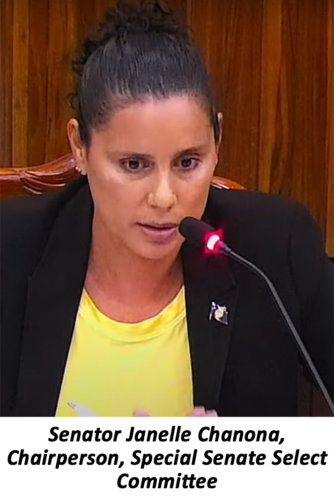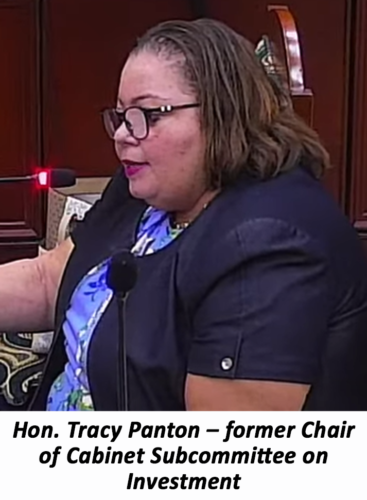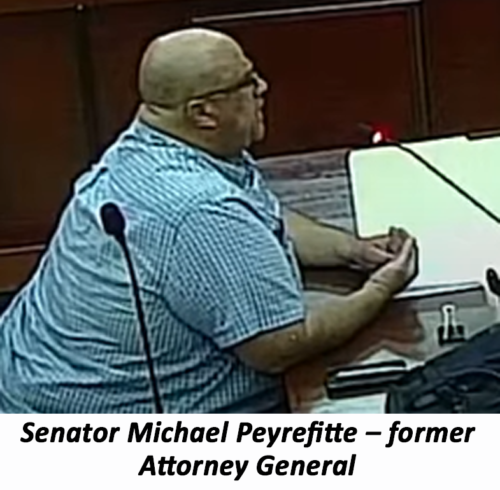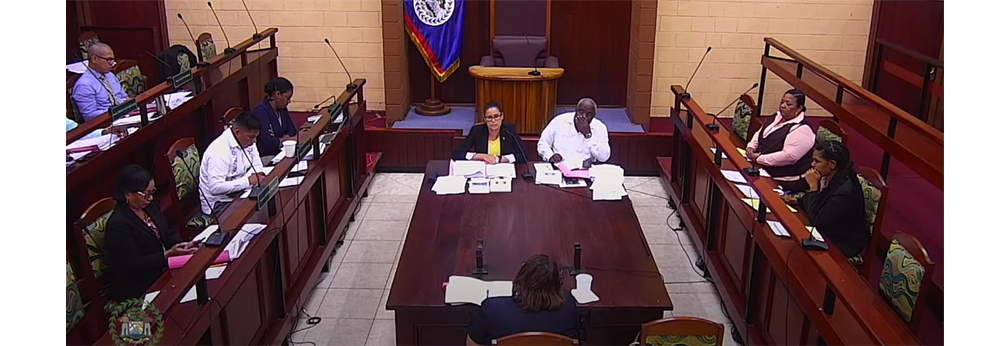by Marco Lopez
BELIZE CITY, Wed. Dec. 6, 2023
Since April 15, 2023, nine meetings have been conducted by the Senate Special Select Committee tasked with investigating the facts surrounding the signing of Portico’s controversial “Definitive Agreement” (DA) by former UDP Minister of Investment Erwin Contreras and the subsequent tabling of the document with accompanying legislation to the PUP Cabinet.

The first of what is to be a series of public hearings commenced on Tuesday, December 5.

Hon. Tracy Panton, the former Chair of the Sub-Committee on Investment (CSCI) for the UDP, was the first to appear before the Senate Committee. In her opening statement, Hon. Panton pointed out that the CSCI had not reached the stage of negotiating a Definitive Agreement for the Portico project – she adamantly maintained that she had not seen the document until it broke in the media. During the morning session, she attempted to spell out the process taken by the Ministry of Investments to approve proposals valued at over US$10 million.

In the afternoon session, Senator Michael Peyrefitte was called for questioning. During his time serving as Attorney General under the UDP administration, he also wore an investment cap as a member of CSCI. According to Peyrefitte, the so-called DA was “dead on arrival” since its onset in his opinion.
Peyrefitte was a partner of the lawyer David Morales who was retained by Portico’s principals. In her testimony in the morning session, Hon. Panton said that Morales was “agitating” and “lobbying” for the committee to fast-track the signing of the DA.
This signing never took place according to both former UDP Cabinet members.
The Process
Both Panton and Peyrefitte outlined the process taken by the Ministry of Investment to vet and approve or deny investments that came to the government for concessionary consideration. Investments over US$10 million would first be submitted to BELTRAIDE – that body acted as the secretariat and supported the investment unit inside the Ministry of Investment. Beltraide would do the initial screening of the investments. Reports and recommendations were sent to the Investment Unit which would then undertake its cost-benefit study of the investment to determine the possible return on investment, job creation, and the incentives requested by the principals of the project.
According to Panton, those studies and recommendations would then be sent to the Cabinet subcommittee, which would use a seven or eight-step process to reach the point of a definitive agreement negotiations, and ultimately for the concessions to be approved by Cabinet.
Step one of the process was the pre-screening phase, followed by the pre-memorandum of understanding phase (MOU), then the MOU phase, after which a comprehensive business proposal was required for stage four, and stage five covered a detailed assessment of the MOU. According to Panton, the Portico project, despite the push by its principals, only reached stage five of the process under the UDP administration.
Step six was another look at the cost-benefit analysis and other studies by the CSCI, and step 7 covered the negotiations of a definitive agreement.
“With the Portico project, the furthest that I recall that we reached was step five, which is in the process of doing a detailed assessment of the post-MOU agreement. There was some, agitation, if you will, by the principals, to expedite a definitive agreement, based on the fact that the elections were near and they wanted this process to be completed under our administration. That was not entertained,” Panton said.
Panton explained that to get to the definitive agreement stage, three critical steps had to be completed – the Environmental Impact Assessment had to be completed with an approved Environmental Compliance plan, the land arrangements for the project had to be in place, and there had to be a clear commitment by a local or foreign financial institution, either here or abroad, that would commit to 30% of the investment cost of the project.
“In the case of Portico, some of the lands that were necessary for the project were in the hands of private land owners; the principals had asked the government to negotiate the acquiring of those lands for the project; and that request was denied,” Panton shared.
An eighth-step, following the signing of a definitive agreement, would be required for projects whose concessions required parliamentary approval; legislation would be drafted and tabled to the House of Representatives for passing in those cases.
Portico’s Agitation
“The attorney for Portico, who as I can recall was David Morales, had reached out to the Investment Director at Beltraide; the director had reached out to me, and I didn’t even take it to the committee; it was not even entertained,” Panton said.
She shared that Morales eventually sent her an email, asking if the government would fast-track the signing of the DA. “I had responded that ‘unless the criteria that I shared with you was met, the matter could not go before the committee’,” Panton said.
That email was sent to Hon. Panton after a call was made to Senator Peyrefitte by his former law partner, who, according to Peyrefitte, inquired about the process of getting the DA signed.
“David Morales telephoned me, and said that he had been retained by Portico, and that he wants a definitive agreement to be signed that he has. I told him we cannot be talking about this; he knows better than that. Secondly, all direction goes to the Chair of the committee; and thirdly, I said to him, ‘did I miss something, because as far as I know we are not at the definitive agreement stage with that particular project,’” Pereyfitte said.
“We had a subsequent meeting of the CSCI after that email, and the committee agreed that there was no way a definitive agreement could be expedited. I shared it as a matter of information because it was my sense that the principals of Portico were reaching out to people individually to try and garner some support for accelerating the definitive agreement. So I wanted committee members to know exactly where I stood on the issue, and for them to be aware that some lobbying was being done,” Panton said.
Peyrefitte said that at the time Morales called him about the DA he had long recused himself from the law office they once ran together.
Note that at the time this lobbying was taking place, the finance had not been secured for the project, the Environmental Impact Assessment had not been completed, and the land was still not in the hands of the principals. “All of which you have to have before you reach a definitive agreement,” Peyrefitte said.
According to Panton and Peyrefitte, no definitive agreement was signed by the UDP administration for the Portico project.
PUP’s attempted adoption of DA
Peyrefitte said he did not see a copy of Portico’s DA until what he describes as a mutiny in the PUP Briceño Cabinet which led to its leak. The document was reportedly accompanied by draft legislation to give parliamentary approval to what is now being considered “outlandish” investment concessions and exemptions requested by Portico.
In February of this year, during a meeting with investors, Peyrefitte said he learned that there was a definitive agreement signed between the government and Portico. He immediately (in March) sent a letter to the Prime Minister, Hon. John Briceño, requesting a copy of the document the first of a series of correspondence that went unanswered.
The second letter was sent on July 10 following a Cabinet meeting. By this time, the Portico DA and draft legislation had already leaked to the public. Peyrefitte wrote to the Prime Minister inquiring about the cost of the legal opinions produced on Portico’s DA.
“I said to Prime Minister July 10, ‘your government retained four attorneys, namely Ben Juratowitch, Callista Harris, Douglas Mendez and Jerome Rajcoomar to advise whether the definitive agreement signed in October 2020 between the then Minister Contreras and Portico Enterprises is binding on the government of Belize. In April 2023, Juratowitch and Harris delivered their joint opinion and on May, 2023, Mendez and Rajcoomar delivered their joint opinion on Juratowitch’s opinion. So, there was moneys paid for an opinion, and then there was money paid for an opinion on the opinion,’” Peyrefitte said.
On the weight of the second legal opinion, the definitive agreement and accompanying draft legislation was tabled to Cabinet. It was subject to much criticism and it was ultimately rejected by Cabinet members.
Peyrefitte on Confidentiality Clause and Concessions
When asked if the confidentiality clause in the Portico DA is common, Peyrefitte said that it should not have been necessary. The first part of the provision which bars the government from sharing any information without the consent of Portico is out of the ordinary, he shared.
As for the concession and exemptions, Peyrefitte said some provisions could not even be granted by the Ministry of Finance, calling them “extremely unusual” and “simply mind-blowing.”
He shared that Erwin Contreras and all members of the investment subcommittee knew that they could not sign a binding agreement.
“Nobody was under any confusion as to how this worked. And you know who else was not under any confusion as to how [the process worked]? Portico,” Peyrefitte said.

